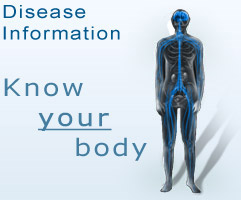Heart Failure
What is heart failure?
The heart is a pump that is responsible for distributing blood throughout the body, supplying oxygen and nutrients to all the organs. Heart failure is a condition that occurs when the heart muscles work less effectively than normal and cannot pump blood as well as they normally do.
As a result of heart failure, the heart may become enlarged or thickened and may also weaken gradually. The heart will still keep pumping, but with less efficiency.
Causes of heart failure
Conditions that damage the heart muscle are implicated in heart failure. The common conditions include:
- coronary artery disease;
- hypertension;
- myocardial infarction (previous heart attack);
- cardiomyopathy;
- diabetes; and
- valvular heart disease.
Symptoms of heart failure
- Shortness of breath is the most common symptom. It may occur while doing strenuous physical activities or walking a long distance; or while performing daily, routine activities such as cleaning. You may wake up from your sleep feeling short of breath. In this instance, it may be useful to sleep with additional pillows. Always report the level of shortness of breath to your doctor during your consultations.
- Ankle swelling. Fluid has accumulated in the ankles due to gravity.
- Weight gain. If your weight increases by 1.5kg over the duration of a day, it means that the heart failure could be worsening. You should restrict your fluid intake and contact your doctor.
- Fatigue.
- Loss of appetite.
What tests are done?
Chest x-ray
The test is used to detect fluid on the lung, which is an important sign of heart failure.
Electrocardiogram (ECG)
This test records the electrical activity of the heart and assists in determining a cause of the heart failure.
Echocardiogram
This test records a picture of the heart chambers, as generated via ultrasonic waves. It can record the degree of the heart failure and assist in determining a cause for the heart failure.
Blood test
Various blood tests will be requested by your doctor that will assist in determining a cause for the heart failure and also monitor for the consequences of the heart failure on various organs.
Living with heart failure
Lifestyle modifications and medication are the two important components for the successful management of heart failure. Both are important to help you live life to its fullest and remain out of hospital.
Lifestyle modifications
- Restrict your salt intake. Salt causes your body to retain fluid and aggravates the heart failure. It is therefore important to reduce your salt intake and not to add any salt to your food. It would be beneficial if you regularly check the nutritional labels on food packages and choose products that contain less than 120mg of sodium per 100g serving. Avoid salty seasonings, processed foods and take-away foods that are notorious for their high salt content. Use garlic, herbs and spices instead of salt.
- Monitor your weight (very important). It is ideal to monitor your weight regularly. A table is provided with this information sheet that will help you plot your weight regularly.
- Your doctor may request that you limit your fluid intake. This could be in the range of 1 to 1.5 litres per day. Weight gain often means that fluid is accumulating in the body (1kg = 1 litre of body fluid). It may therefore become necessary to measure your weight daily, preferably at the same time each day. Discuss with your doctor whether you should take an extra diuretic (‘water pill') if your weight increases by more than 1.5kg from day to day. Reduce fluid intake if your weight increases.
- Limit your alcohol intake. Alcohol can damage your heart. Your doctor may have requested you to reduce your alcohol to about two standard drinks per day or none at all.
- Quit smoking. Smoking damages arteries, including those supplying blood to the heart. To quit smoking is an important part of the management of heart disease and has been shown that a great degree of symptomatic improvement is associated with this.
- Physical activity. Regular, but moderate exercise is beneficial and is encouraged. These exercises include:
o brisk walking;
o cycling; and
o stretching.
Try to exercise at least four days per week for at least 30 minutes at a time.
Medication
- Diuretics are prescribed to reduce the excess fluid in your body.
- ACE inhibitors reduce the workload of the heart, block the effects of detrimental hormones and dilate blood vessels.
- There are many other different types of medication used for heart failure. If you feel that your medication is not working or is causing side effects, please bring it to the attention of your doctor.
o Your pharmacist will also be able to tell your more about your medication.
o Never stop taking your medication without first discussing it with your doctor.
o Always ensure that you have enough medication with you at all times.
References:
http://www.uptodate.com/home/index.html
 TransmedBanner4.jpg)

